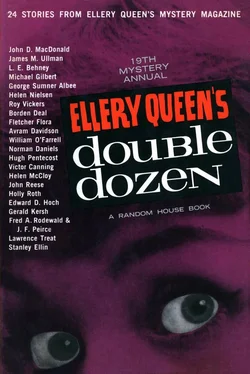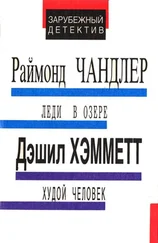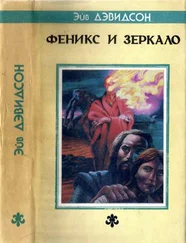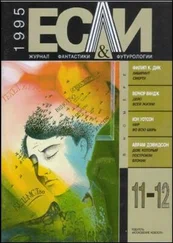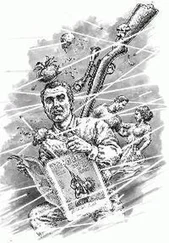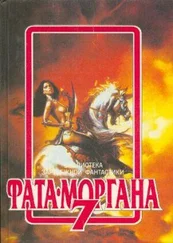“It is not the same thing, my friend. Pepe is human — he cannot be a vehicle.”
Juan could contain himself no longer. “What have you done with Pepe?” he demanded.
“Pepe! Pepe! Pepe!” Carlos shouted, waving his arms. “Why will you not understand? Pepe is no station wagon. I say to him, ‘Pepe, where are your wheels?’ and he tells me he is a station wagon.”
“You have put him in jail?” Juan asked.
“He would not go to jail!” Carlos shouted. He pounded on his desk. “I gave him parking tickets! I gave him tickets for honking his horn! I gave him tickets for disturbing the siesta! I told him for this he must go to jail. But he said he could not go to jail because a station wagon cannot fit into a jail, that a jail is for people.”
“What have you done with him?”
“I have impounded him.”
“You’ve what?”
“I have impounded him! He would not go to jail, so I chained him to one of the government vehicles. I had to! I had to do it! He would not go to jail! So I impounded him as I would a stolen vehicle. Oh, he is a bad station wagon, that Pepe!”
Mike smiled. “Then you do believe that Pepe’s a station wagon?” he said. He tried to visualize the little old man standing off Carlos — Carlos with his heavy arms and broad shoulders.
“Eh? No! He is not a station wagon!” Carlos said.
“But don’t you see that he really is?” Mike said. “He’s as much a station wagon as Juan is a bartender. Juan is a bartender because everyone agrees that he’s a bartender. And Pepe is a station wagon because everyone agrees that he’s a station wagon — except you.”
Carlos shook his head.
“Oh, I know he isn’t official, that he doesn’t have a license. But would you deny Juan a license if he needed it to tend bar?”
Carlos again shook his head, and Mike continued.
“You said, ‘Oh, he is a bad station wagon, that Pepe!’ So you must believe him.”
“I said it only because I was angry.”
“You gave him parking tickets?”
“ Si, I gave him parking tickets.”
“Do you give parking tickets to pedestrians?”
“No. But Pepe is different.”
“Of course he’s different. He’s a station wagon! You gave him tickets for honking his horn, for disturbing the siesta? ”
“Si,” Carlos said and shrugged.
“Do you do this to the others? No, because they don’t have horns.”
“But Pepe’s horn is so loud — it is the loudest horn in all Mexico!”
“But he does have a horn — you have just admitted it. The others, do they have horns?”
“No,” Carlos said. He sighed heavily.
“Of course they don’t. And now you have impounded him. Can you impound a citizen? No! What do you do with citizens who break the law?”
“I put them in jail.”
“But you didn’t put Pepe in jail, even though you are bigger, stronger than he is. You impounded him! You impounded him because he’s a station wagon, because in spite of everything, you believe he’s a station wagon.”
Carlos shrugged imperceptibly. His normal gestures were violent, sweeping, and the two men, who had been following his every move, sensed that this was his moment of truth and were silent.
Carlos studied his strong, brown hands. It was as if he were aware of his hands suddenly for the first time. His expression might have been the same if he were considering cleaning his nails or cutting his hands off at the wrists.
“ ’Sta bien,” he said at last, avoiding their gaze, “give me the license.”
Juan took the license from beneath his shirt and put it into the hand that Carlos held out to him.
Carlos straightened himself to his full height. Then, assuming his most official manner, he strode into the street.
Mike waited with Juan in the comparative cool of the office, but hearing the station wagon start up, the two men rushed to the door in time to see Pepe come charging around the corner of the building. He was bent forward stiffly from the waist. His hands were pressed tight against his forehead, two gnarled fingers projected forward, forming a bumper.
Mike caught a remembered glimpse of the children playing in the sun — and understood.
The station wagon stopped at the sight of them and honked happily. Then with feet churning the dust, Pepe went honking and beeping down the street, his license plate wired to the seat of his pants.
By then Carlos had rejoined them. “Who’ll pay for the tickets?” he asked.
“Wasn’t he the first to use the meters?” Mike asked.
“ Si. It is so.”
Carlos turned to Mike and again assumed his most official manner. “I am sorry, señor,” he said, “but I must give you the ticket for illegal parking. But for you I will make it easy, very easy — only ten pesos.”
“But you said—” Mike began, then broke into a grin and took out the dollar bill he had offered Pepe. “Hell, for eighty cents it’s not worth it. Besides I knew it was going to cost me when I listened to the old man; I just didn’t know how much.”
Lawrence Treat
L As in Loot
It is not generally known, or if known, not generally recognized, that Lawrence Treat was the important pioneer in the origin and development of the contemporary procedural detective novel — the novel of what might be called the “public eye” Of course, in their own times, many famous fictional characters operated as procedural detectives; for examples: Gaboriau’s Lecoq, in his own (and by today’s standards, primitive ) way; the various detectives whose exploits (chiefly imagined) were chronicled by Allan Pinkerton; R. Austin Freeman’s Dr. Thorndyke, with his scientific (and still sound) methods; and Freeman Wills Crofts’ Inspector French cases which surely emphasized legwork and painstaking investigation.
But it was Lawrence Treat who gave the realistic procedural approach a feeling of substance and unity in a modern sense. His earliest novel in this genre was V As in Victim, published in 1945 (nearly twenty years ago!) which was ten years before J. J. Marric’s (John Creasey’s) first Gideon novel, Gideon’s Day (1955), and eleven years before Ed McBain’s first novel of the 87th Precinct, Cop Hater (1956). Other Lawrence Treat novels were called, in a title pattern all his own, H As in Hunted, Q As in Quicksand, F As in Flight, and T As in Trapped. Anthony Boucher made the historical point clear when he wrote: “The prime pioneer in the naturalistic novel of police procedure was Lawrence Treat whose stories... are not only far ahead of their times but admirable in themselves.”
(Note to Anthony Boucher: How would you classify William MacHarg’s The Affairs of O’Malley — short stories which were first published in book form in 1940 but began to appear in magazines much earlier? Wasn’t it William MacHarg, that grand old man, who started the procedural trend?)
But to get back to Lawrence Treat and his major contribution to the form: two characters carry the ball, as a kind of ’tec team, in Mr. Treat’s procedural stories — detective Mitch Taylor and laboratory technician Jub Freeman. (Was it sheer coincidence that Mr. Treat chose the same surname as Dr. Thorndyke’s creator, R. Austin Freeman?) The germ of Mitch Taylor’s character (the germ only) came out of a five-minute interview that Mr. Treat had at a New York City precinct house in the early 1940s, when Mr. Treat and a friend reported some obscene anonymous phone calls. The germ of Jub Freeman came from Mr. Treat’s persistent “hanging around” the New York City technical lab — the perfect place, of course, for Jub Freeman to be born. Other realistic details, of procedure and technique and background, emerged from an unofficial “hitch” with the San Diego police force while Edward Dieckman was Chief of Homicide ( Mr. Dieckman has since become a true-crime writer who really “knows his stuff”).
Читать дальше
